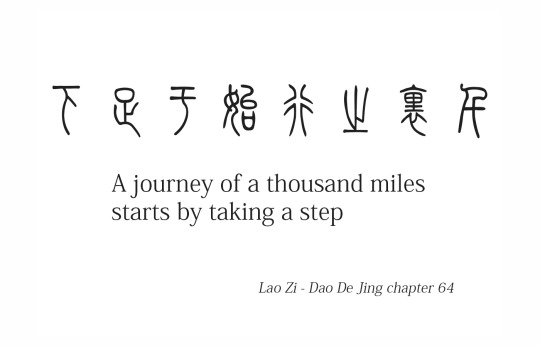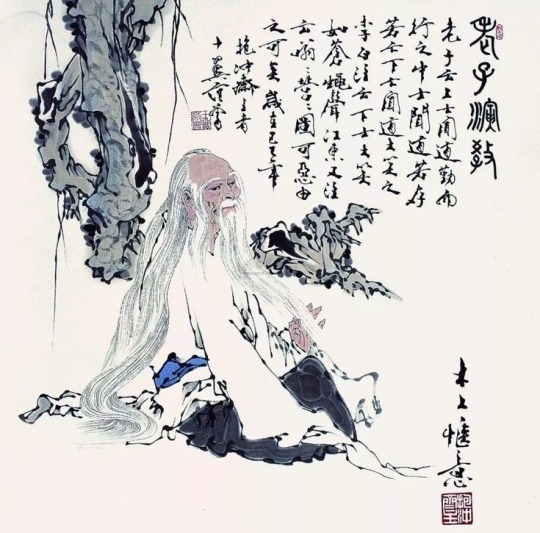#dao de jing
Photo
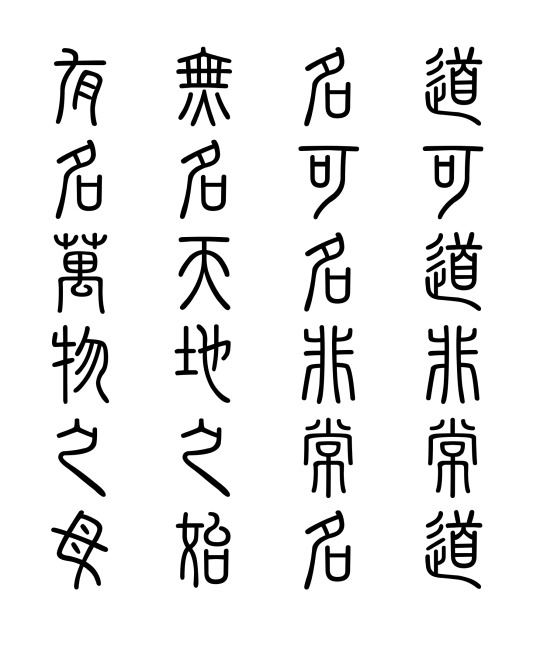
First lines of the Dao De Jing in the ancient Chinese Seal Script:
The Dao that can be trodden is not the enduring and unchanging Dao.
The name that can be named is not the enduring and unchanging name.
Having no name, it is the Originator of heaven and earth;
having a name, it is the Mother of all things.
#daoism#daoist#dao de jing#taoism#taoist#tao te ching#chinese#seal script#calligraphy#classical chinese#philosophy
131 notes
·
View notes
Text
Can/Do Bad People Cultivate The Great Inarticulate Dao?
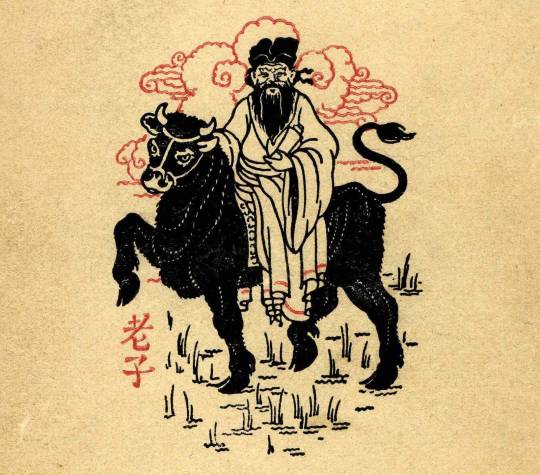
Short answer: Yes, they most certainly do. The reason is the Dao's ability to penetrate and be a part of All Things.
What brings this to my attention is chapter 62 of the Dao de Jing, and I am working with Rudolph G. Wagner and William S. Wilson's translations and Wang Bi's commentaries.
The sections I want to focus on are as follows:
Wilson: "It (the Dao) is a treasure for the good man who is a blessing for all, and a place of support for the bad man, as it would carry him on its back as though he were a child."
Wagner: "It (the Dao) is what is treasured by good men. It is what men who are not good protect."
Two very different translations here. Not sure which one I prefer, but regardless, working with two or more translations is an essential component for studying the Dao de Jing or any other Daoist literature, as an English-only reader.
The first thing that is glaring to me is the Dao's non-discriminatory qualities. For the bad person and the good person alike, both confide in the Dao, even if their crafts differ. For the bad man, we will use the character of a thief, and for the good man, someone who is pious and an upstanding, law-abiding citizen, and perhaps someone with privilege (someone with political status or a well-respected business person). If we recall the story of Lord Wenhui and Cook Ding in book three of the Zhuangzi, we can see that even for someone with high status, and more privilege, it is not enough to cultivate the Dao. In that story, Cook Ding astonished Lord Wenhui with his mastery and cultivation of the inarticulate Dao. Rich or poor, rank, privilege, and societal status are never prerequisites for cultivating and mastering the Dao. For more on this story, please take a look at my commentary on this particular section of the Zhuangzi.
So the Dao makes no distinctions between the good and bad man, okay, cool. So does this mean a thief can practice their craft with Virtue and in step with the Dao? According to Zhuangzi, yes. In a section I have not read yet, Robber Zhi's disciples ask him if there is such a thing as the "Dao of thieving?" To which Robber Zhi responds: "Which profession is there that has not its (The Dao's) principles?"
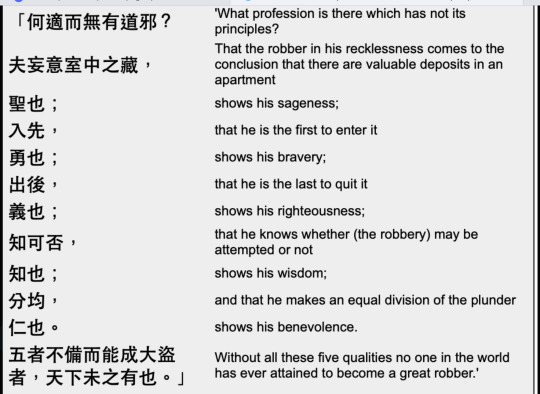
As seen above in the picture, the thief exudes the principles of the Dao.
As suggested by Wang Bi's commentaries on these verses from chapter 62, the one who is bad and practices the Dao, they avoid harm and the punishment of their thievery. When taken at a surface level-reading, this sounds like Daoism or the Dao itself excuses bad behavior. But this is not the case. What this is saying, I think, is that the Dao and Virtue are the bedrock of the world. As suggested in the photo above, the thief cannot but help to practice thievery with at least some virtue and principles that are in accordance with the Dao. Daoism doesn't promote thievery or any kind of bad behavior, but it encourages us to be true to our nature, be true to ourselves and our circumstances, and act accordingly to what Fate presents us.
I wish to impose a suggestion that when a thief practices thievery in step with the Dao and its principles, they can eventually turn away from their life of crime. This sentiment is not explicitly mentioned in the Zhuangzi or Wagner's translations of chapter 62. But if we turn to Wilson's translation of the last few words in his copy of the Dao de Jing, it states as follows:
"Why did the men of old treasure this Way? Didn't they say that those who seek it out will pick it up along the way, and that those who have been caught like fish in the nets of crime will be pardoned and given new life? Thus, it makes all under Heaven treasure it.
Compare it with Wagner's:
"What is the reason why the ancients valued this Way? Did they not say: If the good ones strive by means of the Way, they will achieve it, while those who have committed crimes avoid punishment by means of The Way? That is why it (The Dao) is most valued by All Under Heaven."
As you can see, Wagner's translation still gives off a vibe that the Dao excuses those who commit crimes and can thus avoid apprehension and repercussions. While this is one correct way to look at it, we must dig deeper into what the text is trying to tell us. I will take advantage of this opportunity to stress again the importance of working with two or more translations with these kinds of texts.
Focusing on Wilson's translation gives more leniency to my imposition that the thief can eventually turn away from their life of crime when they practice Virtue and the principles that are in accord with the inarticulate Dao. While it may be argued that the thief or good man has no choice but to rely on Virtue and the Dao in their craft, as suggested by the photo of the excerpt from the Zhuangzi, I dare say there is a choice. Some people are ultra-violent and have no code of conduct for their crimes; I can attest this much from first-hand, anecdotal experiences from my life as a former thief. We must remember the Dao supersedes and transcends all human-noted distinctions (Zhuangzi chapter 2) and that any Dao that can be articulated is not the Unchanging Dao (Dao de Jing 1). What "is" good and what "is" bad has no room when embarking on the Inarticulate Dao. The only example I can give you, wonderful people, is my own life experience with crime and turning away from that.
When my old using buddies and I would embark on a boosting heist (I'm making this sound all fancy, but it's really just a clever way to steal from department stores in plain sight), we would only steal what we need to get to feel better, get high and put food in our bellies. We never robbed people at gunpoint; no threats or violence had ever ensued. Did we practice thievery in step with Dao and its Virtue? Perhaps, perhaps not. But as suggested in the picture above of Robber Zhi speaking to his disciples, we practiced all of those things unknowingly, of course. It is truly an anomaly that we were never apprehended and faced repercussions. We can throw out any suggestion of white privilege because I was just the driver, not the one actually going into the stores and performing the boost. The ones who got their hands "dirty" were all people of color. Though, I'm not suggesting at all that my hands were ever "clean" because I was just a mere getaway driver. I am simply pointing out that race had no play in our evading of repercussions.
Here we were, as suggested by Wilson's translation, all caught up in the nets of crime such as drug dealing and purchasing, and thievery. I know of two people who have been pardoned and given new life, myself and the one who actually would go in and perform the boost. I've kept in contact with the "master thief" who would actually go into these department stores and perform the boost. He is sober, doesn't steal or boost anymore, and has a well-paying job; and importantly was never arrested for these crimes we committed together. Whether he is telling me the truth is beside the point because I, too, have turned away from my life of crime, and it seems like my friend has, too. If he did face repercussions, then, of course, my white privilege could've been a massive factor in my evading repercussions for these particular crimes. My friend has no reason to lie about this, though. So I can't help but think that both of us (when mainly it was just us two doing the boots/thievery) evaded harm and repercussions because we practiced our craft with Virtue as our bedrock. We are both good people who didn't wish to live such a life that was fueled by petty crime and drugs. With our Virtue still intact, we escaped the vicious cycle of drugs and petty crime.
So, in conclusion, yes, both "good" and "bad" people cultivate the Dao and its Virtue. We should not "gatekeep" the Dao and its teachings to only the good, pious person. The Dao and all its teachings should be available to everyone: the Cook, the beggar, the thief, and the King. The Dao doesn't discriminate between our petty human distinctions, and we should be more aligned with Nature's natural distinctions. Just as the Dao is a treasure for the goodman who is a blessing for all, it (the Dao) is equally there for the bad person and is its place of support.
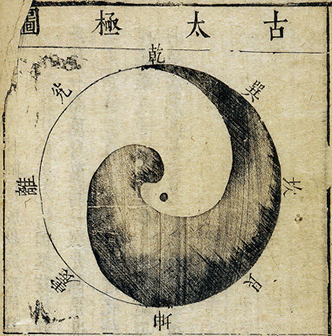
#daoism#philosophy#zhuangzi#dao dejing#taoism#tao te ching#chinese religion#chinese philosophy#lao tzu#laozi#dao de jing
39 notes
·
View notes
Text
I have access to an academic book about Daoism and there is a section on symbolism and women in the Dao De Jing and the Zhuangzi. If anyone is interested I have screenshots to share!
#daoism#dao de jing#zhuangzi#laozi#chaung tzu#lao tzu#taoism#tao#dao#me#academia#studyblr#feminism#radfem safe
39 notes
·
View notes
Text
Mandarin Reading Material Recommendation
Wed Sep 13 2023
Topic: Religion
If you are religious or enjoy studying various religions there are mandarin translations of the most popular religious texts and possibly more! It's best if you've already read these texts in your native language though, it helps with context to learn faster.
Here's some links:
Bible (Simplified) (Traditional)
Quran (Simplified) / (Simplified) (Traditional)
Dao De Jing (Simplified) (Traditional)
Tripitaka (Simplified) (Traditional)
#chinese langblr#mandarin langblr#learn chinese#chinese lesson#chinese vocab#chinese to english#religious language#religious texts#religious studies#religion study#中文#聖經#古蘭經#繁體字#bible#old testament#quran#koran#tripitaka#dao de jing#daoism#christianity#islam#buddhism#language learning material
12 notes
·
View notes
Text
Going to repost the translation because I found a mistake and somehow editing it will not fix it in reblogs, and I don’t want to mislead anyone, so here is the updated version:
“道可道也,非恒道也。名可名也,非恒名也。无名,万物之始也;有名,万物之母也。故恒无欲也,以观其眇;恒有欲也,以观其所徼。两者同出,异名同谓。玄之又玄,众眇之门。”
-- 《道德经》,第一章
This is the first chapter of Daodejing, which I will attempt to translate here based on my own understanding of it (if anyone sees any problem with it, feel free to point it out to me):
"Dao that can be described is not constant; Name that can be named is not constant. Nameless and formless is the origin of all things; Named and corporeal is the mother of all things. Therefore always be without want, in order to observe the subtle wonders; always be with want, in order to observe the substance. The Nameless and the Named are of the same origin but are referred to under different terms. It is the most profound and the gateway to all wonders of the world."
25 notes
·
View notes
Text
“the world is a sacred instrument”
— lao tzu, tao te ching 29.3 (trans. derek lin)
#my reading#quote#poetry#running up that hill#lao tzu#tao te ching#dao de jing#taoism#daoism#words#derek lin
17 notes
·
View notes
Text

9 notes
·
View notes
Text
[...]
Be content with what you have;
rejoice in the way things are.
When you realize nothing is lacking,
the whole world belongs to you.
(Tao Te Ching, ch. 44, courtesy of Stephen Mitchell)
#I like to flip to random pages#just to see what I get#I think I really needed this today#tao te ching#dao de jing#lao tzu#laozi#taoism#daoism#the tao#the dao#taoblr#daoblr#taoist#daoist
20 notes
·
View notes
Text
fuck it. dao time

7 notes
·
View notes
Text
This has probably ran itself into the mud but I like how some Buddhist, Taoist, and other eastern beliefs are all tied into Avatar. And the whole flow thing reminds me of when iroh told Zuko to go with the flow. Didn't realize it was a Taoist thing lol
5 notes
·
View notes
Text

5 notes
·
View notes
Text
[Classical Mandarin->English]
Lao Zi (Lao Tzu/老子) Quote from Chapter 64 of the Dao De Jing (Tao Te Ching/道德经/道德經) - Color Coded Translation
—
千里之行,始於足下
千里之行,始于足下
qiān lǐ zhī xíng,shǐ yú zú xià
The journey of 1000 (chinese) miles starts under your feet.
—
Please correct me if I made a mistake.
#color coded translation#chinese langblr#learn chinese#mandarin langblr#chinese lesson#chinese vocab#chinese to english#classical chinese#classical mandarin#tao te ching#dao de jing#daoism#taoism#taoist#daoist#lao tzu#lao zi#ancient Chinese#chinese proverb#chinese poetry#chinese poem
14 notes
·
View notes
Text
“大方无隅,大器免成,大音希声,大象无形。”
--《道德经》,第四十一章(马王堆帛书版)
"The greatest space has no corners;
The greatest object doesn't need to be formed;
The loudest sound cannot be heard;
The greatest form has no shape."
--Dao De Jing, Chapter 41 (Mawangdui silk version; edited from Keith H. Seddon's translation)
#there are multiple versions of dao de jing#this is from one of the oldest known versions#dao de jing#道德经
14 notes
·
View notes
Text
Laozi on Martiality: Warfare and Arms Use
Civility and martiality from the Taoist point of view are only in an imaginary confrontation. Taoism denies both, since both represent a deviation from primordial naturalness. However, a close examination of scholar sources shows that despite the condemnation of war in the writings of Laozi, classical philosophy considers it justified to resort to weapons if one is guided by…
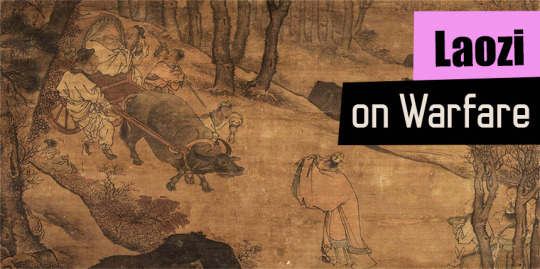
View On WordPress
#ancient China#Chinese history#Chinese martial arts#Chinese mythology#Chinese philosophy#Dao de Jing#internal alchemy#Lao Tzu#Laozi#neijia#philosophy#Tao Te Ching#Taoism#traditional martial arts
1 note
·
View note
